HUMN 344 Assignment: Artificial Intelligence's Impact on Culture
VerifiedAdded on 2022/09/14
|6
|1327
|17
Annotated Bibliography
AI Summary
This annotated bibliography, prepared by Mesgana Desta, examines the multifaceted impact of Artificial Intelligence on culture. The assignment, completed for HUMN 344, analyzes several scholarly sources to explore AI's influence on various aspects of society. The sources cover topics such as job displacement due to automation, the evolution of work, the ethical considerations of AI, and its impact on industries like healthcare and finance. The bibliography includes articles and research papers that delve into the transformative effects of AI on human life, including both the potential benefits and the challenges that arise from its integration into daily life. The analysis also touches upon the economic, legal, and political implications of AI, highlighting the need for ongoing discussions and preparations for the future.

Mesgana Desta
Professor : Sarah Ketchley
HUMN 344 7982
5 April 2020
Professor : Sarah Ketchley
HUMN 344 7982
5 April 2020
Paraphrase This Document
Need a fresh take? Get an instant paraphrase of this document with our AI Paraphraser
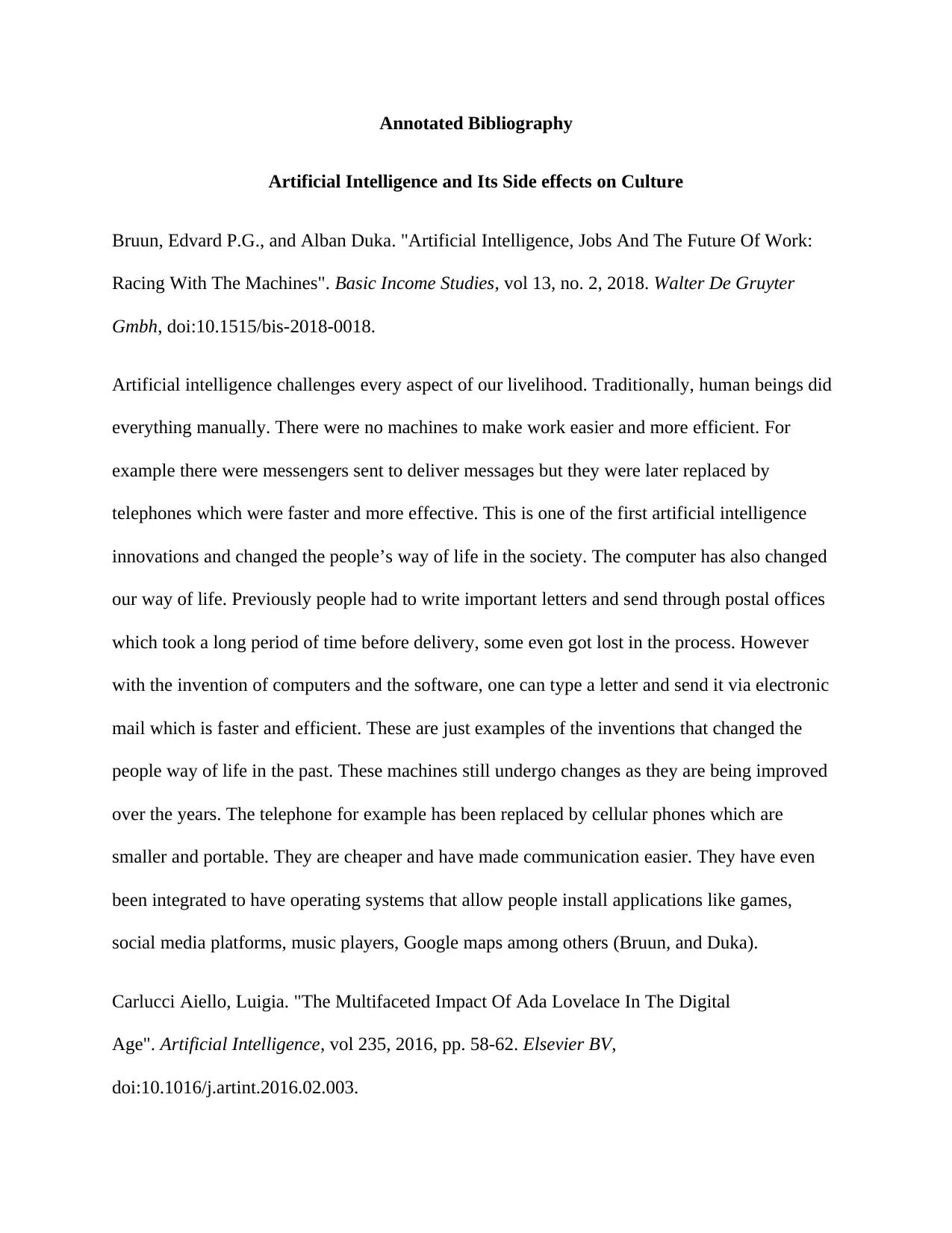
Annotated Bibliography
Artificial Intelligence and Its Side effects on Culture
Bruun, Edvard P.G., and Alban Duka. "Artificial Intelligence, Jobs And The Future Of Work:
Racing With The Machines". Basic Income Studies, vol 13, no. 2, 2018. Walter De Gruyter
Gmbh, doi:10.1515/bis-2018-0018.
Artificial intelligence challenges every aspect of our livelihood. Traditionally, human beings did
everything manually. There were no machines to make work easier and more efficient. For
example there were messengers sent to deliver messages but they were later replaced by
telephones which were faster and more effective. This is one of the first artificial intelligence
innovations and changed the people’s way of life in the society. The computer has also changed
our way of life. Previously people had to write important letters and send through postal offices
which took a long period of time before delivery, some even got lost in the process. However
with the invention of computers and the software, one can type a letter and send it via electronic
mail which is faster and efficient. These are just examples of the inventions that changed the
people way of life in the past. These machines still undergo changes as they are being improved
over the years. The telephone for example has been replaced by cellular phones which are
smaller and portable. They are cheaper and have made communication easier. They have even
been integrated to have operating systems that allow people install applications like games,
social media platforms, music players, Google maps among others (Bruun, and Duka).
Carlucci Aiello, Luigia. "The Multifaceted Impact Of Ada Lovelace In The Digital
Age". Artificial Intelligence, vol 235, 2016, pp. 58-62. Elsevier BV,
doi:10.1016/j.artint.2016.02.003.
Artificial Intelligence and Its Side effects on Culture
Bruun, Edvard P.G., and Alban Duka. "Artificial Intelligence, Jobs And The Future Of Work:
Racing With The Machines". Basic Income Studies, vol 13, no. 2, 2018. Walter De Gruyter
Gmbh, doi:10.1515/bis-2018-0018.
Artificial intelligence challenges every aspect of our livelihood. Traditionally, human beings did
everything manually. There were no machines to make work easier and more efficient. For
example there were messengers sent to deliver messages but they were later replaced by
telephones which were faster and more effective. This is one of the first artificial intelligence
innovations and changed the people’s way of life in the society. The computer has also changed
our way of life. Previously people had to write important letters and send through postal offices
which took a long period of time before delivery, some even got lost in the process. However
with the invention of computers and the software, one can type a letter and send it via electronic
mail which is faster and efficient. These are just examples of the inventions that changed the
people way of life in the past. These machines still undergo changes as they are being improved
over the years. The telephone for example has been replaced by cellular phones which are
smaller and portable. They are cheaper and have made communication easier. They have even
been integrated to have operating systems that allow people install applications like games,
social media platforms, music players, Google maps among others (Bruun, and Duka).
Carlucci Aiello, Luigia. "The Multifaceted Impact Of Ada Lovelace In The Digital
Age". Artificial Intelligence, vol 235, 2016, pp. 58-62. Elsevier BV,
doi:10.1016/j.artint.2016.02.003.
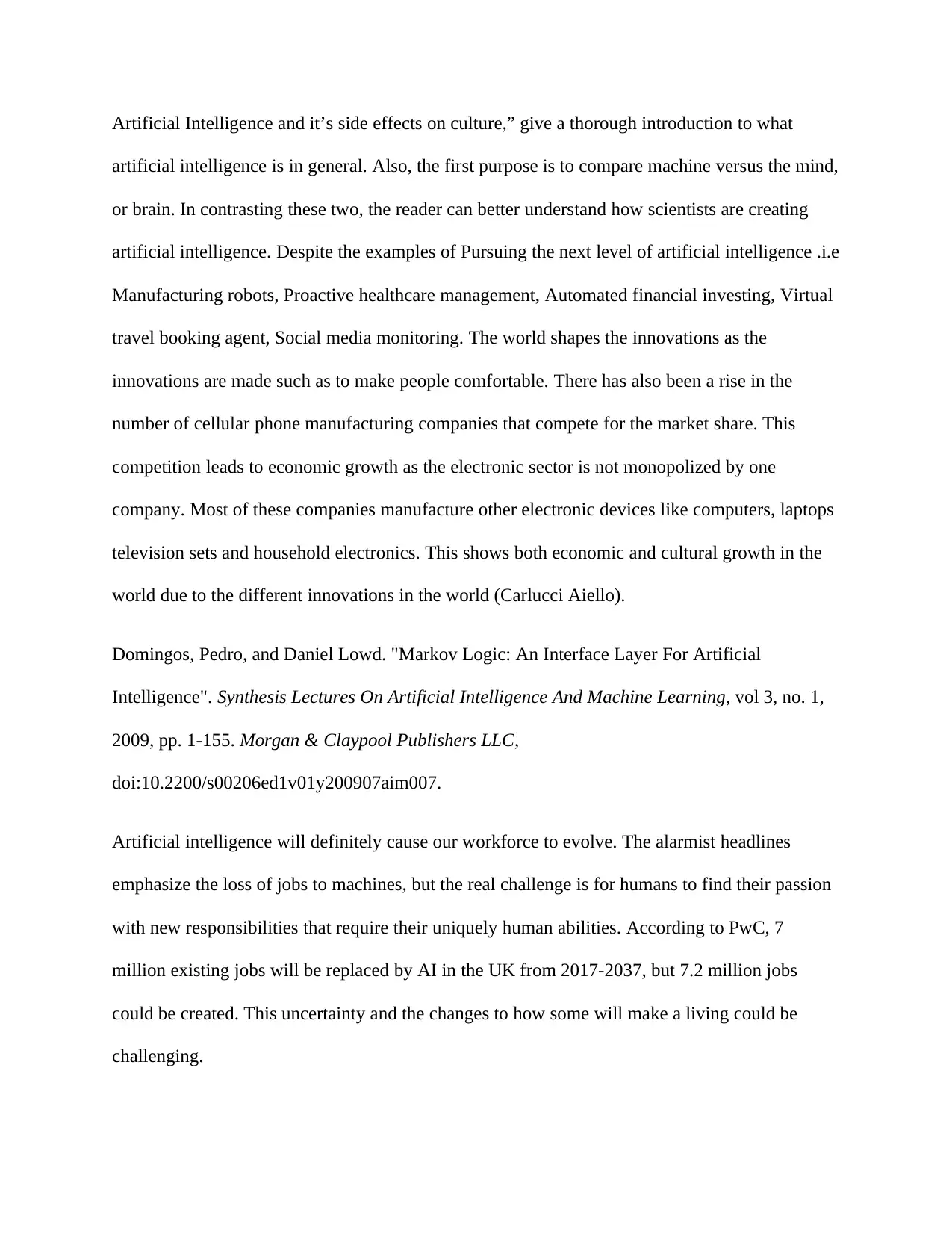
Artificial Intelligence and it’s side effects on culture,” give a thorough introduction to what
artificial intelligence is in general. Also, the first purpose is to compare machine versus the mind,
or brain. In contrasting these two, the reader can better understand how scientists are creating
artificial intelligence. Despite the examples of Pursuing the next level of artificial intelligence .i.e
Manufacturing robots, Proactive healthcare management, Automated financial investing, Virtual
travel booking agent, Social media monitoring. The world shapes the innovations as the
innovations are made such as to make people comfortable. There has also been a rise in the
number of cellular phone manufacturing companies that compete for the market share. This
competition leads to economic growth as the electronic sector is not monopolized by one
company. Most of these companies manufacture other electronic devices like computers, laptops
television sets and household electronics. This shows both economic and cultural growth in the
world due to the different innovations in the world (Carlucci Aiello).
Domingos, Pedro, and Daniel Lowd. "Markov Logic: An Interface Layer For Artificial
Intelligence". Synthesis Lectures On Artificial Intelligence And Machine Learning, vol 3, no. 1,
2009, pp. 1-155. Morgan & Claypool Publishers LLC,
doi:10.2200/s00206ed1v01y200907aim007.
Artificial intelligence will definitely cause our workforce to evolve. The alarmist headlines
emphasize the loss of jobs to machines, but the real challenge is for humans to find their passion
with new responsibilities that require their uniquely human abilities. According to PwC, 7
million existing jobs will be replaced by AI in the UK from 2017-2037, but 7.2 million jobs
could be created. This uncertainty and the changes to how some will make a living could be
challenging.
artificial intelligence is in general. Also, the first purpose is to compare machine versus the mind,
or brain. In contrasting these two, the reader can better understand how scientists are creating
artificial intelligence. Despite the examples of Pursuing the next level of artificial intelligence .i.e
Manufacturing robots, Proactive healthcare management, Automated financial investing, Virtual
travel booking agent, Social media monitoring. The world shapes the innovations as the
innovations are made such as to make people comfortable. There has also been a rise in the
number of cellular phone manufacturing companies that compete for the market share. This
competition leads to economic growth as the electronic sector is not monopolized by one
company. Most of these companies manufacture other electronic devices like computers, laptops
television sets and household electronics. This shows both economic and cultural growth in the
world due to the different innovations in the world (Carlucci Aiello).
Domingos, Pedro, and Daniel Lowd. "Markov Logic: An Interface Layer For Artificial
Intelligence". Synthesis Lectures On Artificial Intelligence And Machine Learning, vol 3, no. 1,
2009, pp. 1-155. Morgan & Claypool Publishers LLC,
doi:10.2200/s00206ed1v01y200907aim007.
Artificial intelligence will definitely cause our workforce to evolve. The alarmist headlines
emphasize the loss of jobs to machines, but the real challenge is for humans to find their passion
with new responsibilities that require their uniquely human abilities. According to PwC, 7
million existing jobs will be replaced by AI in the UK from 2017-2037, but 7.2 million jobs
could be created. This uncertainty and the changes to how some will make a living could be
challenging.
⊘ This is a preview!⊘
Do you want full access?
Subscribe today to unlock all pages.

Trusted by 1+ million students worldwide
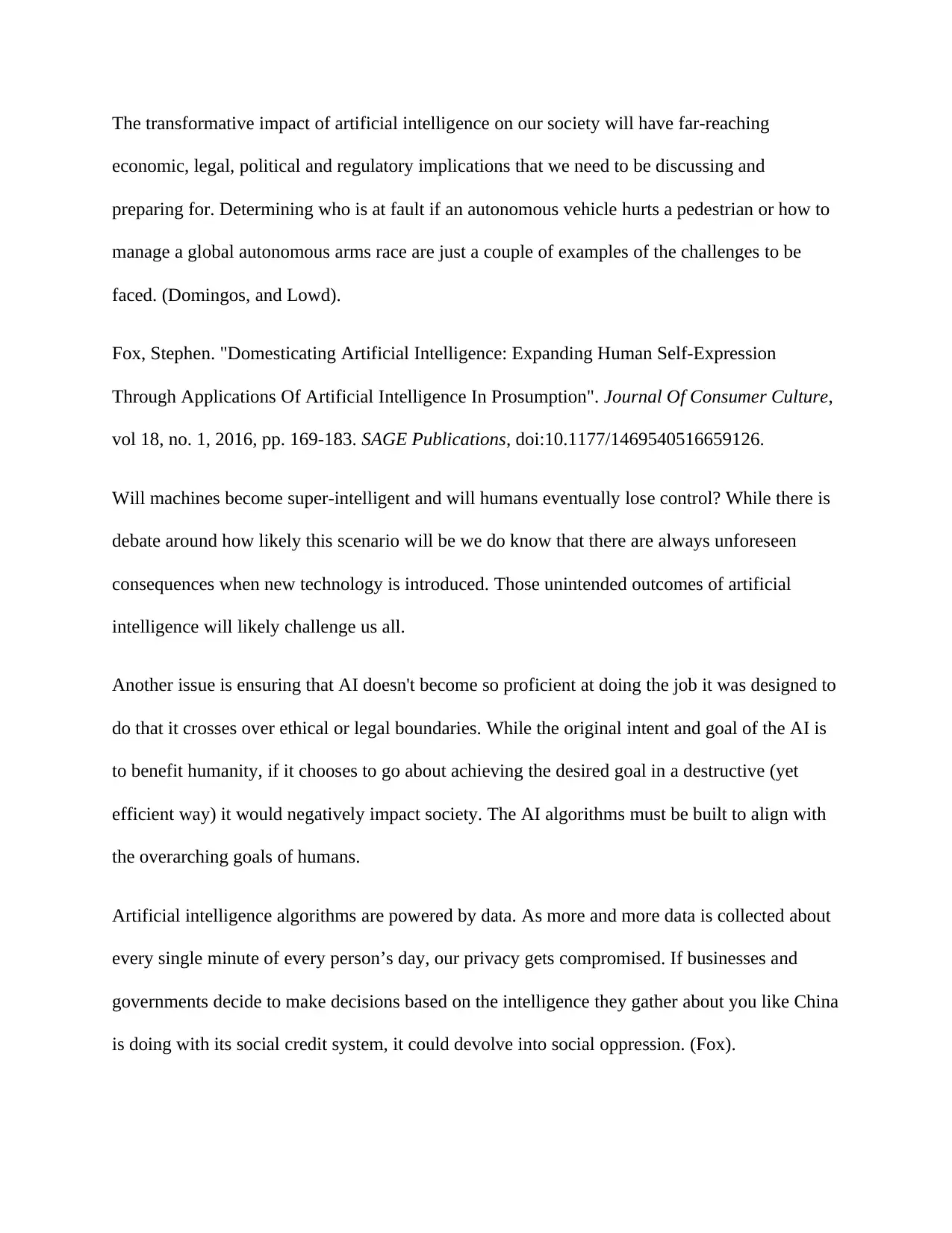
The transformative impact of artificial intelligence on our society will have far-reaching
economic, legal, political and regulatory implications that we need to be discussing and
preparing for. Determining who is at fault if an autonomous vehicle hurts a pedestrian or how to
manage a global autonomous arms race are just a couple of examples of the challenges to be
faced. (Domingos, and Lowd).
Fox, Stephen. "Domesticating Artificial Intelligence: Expanding Human Self-Expression
Through Applications Of Artificial Intelligence In Prosumption". Journal Of Consumer Culture,
vol 18, no. 1, 2016, pp. 169-183. SAGE Publications, doi:10.1177/1469540516659126.
Will machines become super-intelligent and will humans eventually lose control? While there is
debate around how likely this scenario will be we do know that there are always unforeseen
consequences when new technology is introduced. Those unintended outcomes of artificial
intelligence will likely challenge us all.
Another issue is ensuring that AI doesn't become so proficient at doing the job it was designed to
do that it crosses over ethical or legal boundaries. While the original intent and goal of the AI is
to benefit humanity, if it chooses to go about achieving the desired goal in a destructive (yet
efficient way) it would negatively impact society. The AI algorithms must be built to align with
the overarching goals of humans.
Artificial intelligence algorithms are powered by data. As more and more data is collected about
every single minute of every person’s day, our privacy gets compromised. If businesses and
governments decide to make decisions based on the intelligence they gather about you like China
is doing with its social credit system, it could devolve into social oppression. (Fox).
economic, legal, political and regulatory implications that we need to be discussing and
preparing for. Determining who is at fault if an autonomous vehicle hurts a pedestrian or how to
manage a global autonomous arms race are just a couple of examples of the challenges to be
faced. (Domingos, and Lowd).
Fox, Stephen. "Domesticating Artificial Intelligence: Expanding Human Self-Expression
Through Applications Of Artificial Intelligence In Prosumption". Journal Of Consumer Culture,
vol 18, no. 1, 2016, pp. 169-183. SAGE Publications, doi:10.1177/1469540516659126.
Will machines become super-intelligent and will humans eventually lose control? While there is
debate around how likely this scenario will be we do know that there are always unforeseen
consequences when new technology is introduced. Those unintended outcomes of artificial
intelligence will likely challenge us all.
Another issue is ensuring that AI doesn't become so proficient at doing the job it was designed to
do that it crosses over ethical or legal boundaries. While the original intent and goal of the AI is
to benefit humanity, if it chooses to go about achieving the desired goal in a destructive (yet
efficient way) it would negatively impact society. The AI algorithms must be built to align with
the overarching goals of humans.
Artificial intelligence algorithms are powered by data. As more and more data is collected about
every single minute of every person’s day, our privacy gets compromised. If businesses and
governments decide to make decisions based on the intelligence they gather about you like China
is doing with its social credit system, it could devolve into social oppression. (Fox).
Paraphrase This Document
Need a fresh take? Get an instant paraphrase of this document with our AI Paraphraser
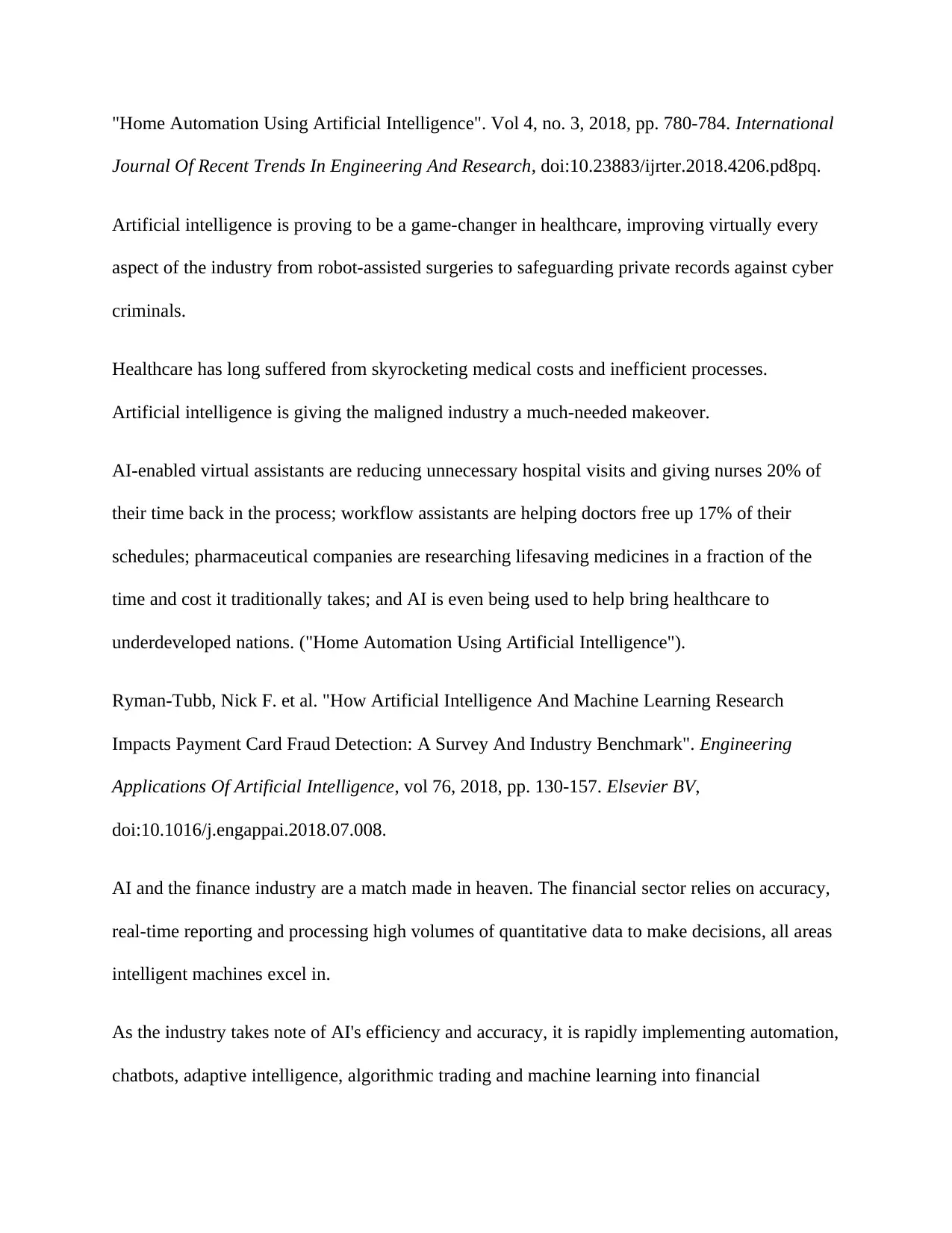
"Home Automation Using Artificial Intelligence". Vol 4, no. 3, 2018, pp. 780-784. International
Journal Of Recent Trends In Engineering And Research, doi:10.23883/ijrter.2018.4206.pd8pq.
Artificial intelligence is proving to be a game-changer in healthcare, improving virtually every
aspect of the industry from robot-assisted surgeries to safeguarding private records against cyber
criminals.
Healthcare has long suffered from skyrocketing medical costs and inefficient processes.
Artificial intelligence is giving the maligned industry a much-needed makeover.
AI-enabled virtual assistants are reducing unnecessary hospital visits and giving nurses 20% of
their time back in the process; workflow assistants are helping doctors free up 17% of their
schedules; pharmaceutical companies are researching lifesaving medicines in a fraction of the
time and cost it traditionally takes; and AI is even being used to help bring healthcare to
underdeveloped nations. ("Home Automation Using Artificial Intelligence").
Ryman-Tubb, Nick F. et al. "How Artificial Intelligence And Machine Learning Research
Impacts Payment Card Fraud Detection: A Survey And Industry Benchmark". Engineering
Applications Of Artificial Intelligence, vol 76, 2018, pp. 130-157. Elsevier BV,
doi:10.1016/j.engappai.2018.07.008.
AI and the finance industry are a match made in heaven. The financial sector relies on accuracy,
real-time reporting and processing high volumes of quantitative data to make decisions, all areas
intelligent machines excel in.
As the industry takes note of AI's efficiency and accuracy, it is rapidly implementing automation,
chatbots, adaptive intelligence, algorithmic trading and machine learning into financial
Journal Of Recent Trends In Engineering And Research, doi:10.23883/ijrter.2018.4206.pd8pq.
Artificial intelligence is proving to be a game-changer in healthcare, improving virtually every
aspect of the industry from robot-assisted surgeries to safeguarding private records against cyber
criminals.
Healthcare has long suffered from skyrocketing medical costs and inefficient processes.
Artificial intelligence is giving the maligned industry a much-needed makeover.
AI-enabled virtual assistants are reducing unnecessary hospital visits and giving nurses 20% of
their time back in the process; workflow assistants are helping doctors free up 17% of their
schedules; pharmaceutical companies are researching lifesaving medicines in a fraction of the
time and cost it traditionally takes; and AI is even being used to help bring healthcare to
underdeveloped nations. ("Home Automation Using Artificial Intelligence").
Ryman-Tubb, Nick F. et al. "How Artificial Intelligence And Machine Learning Research
Impacts Payment Card Fraud Detection: A Survey And Industry Benchmark". Engineering
Applications Of Artificial Intelligence, vol 76, 2018, pp. 130-157. Elsevier BV,
doi:10.1016/j.engappai.2018.07.008.
AI and the finance industry are a match made in heaven. The financial sector relies on accuracy,
real-time reporting and processing high volumes of quantitative data to make decisions, all areas
intelligent machines excel in.
As the industry takes note of AI's efficiency and accuracy, it is rapidly implementing automation,
chatbots, adaptive intelligence, algorithmic trading and machine learning into financial
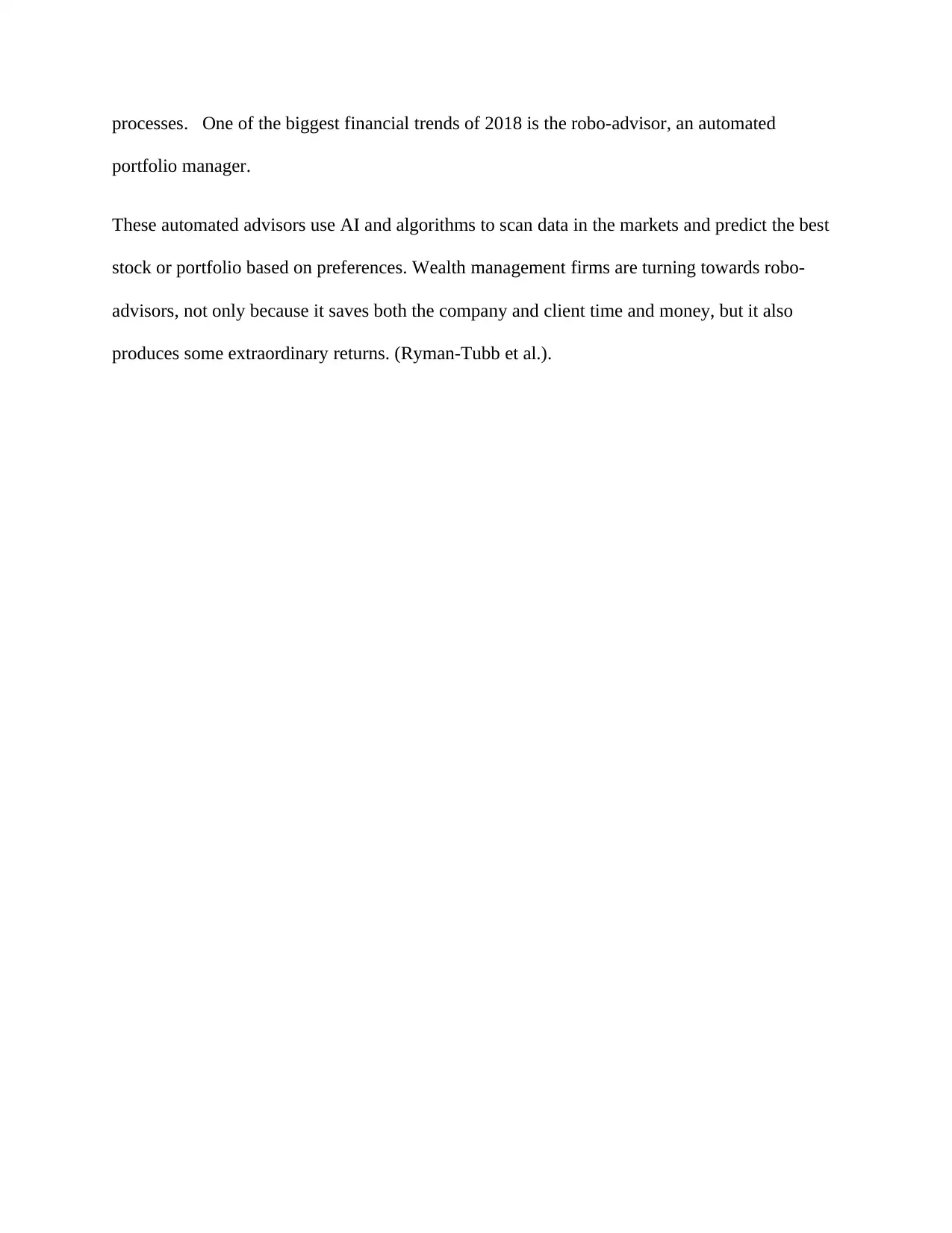
processes. One of the biggest financial trends of 2018 is the robo-advisor, an automated
portfolio manager.
These automated advisors use AI and algorithms to scan data in the markets and predict the best
stock or portfolio based on preferences. Wealth management firms are turning towards robo-
advisors, not only because it saves both the company and client time and money, but it also
produces some extraordinary returns. (Ryman-Tubb et al.).
portfolio manager.
These automated advisors use AI and algorithms to scan data in the markets and predict the best
stock or portfolio based on preferences. Wealth management firms are turning towards robo-
advisors, not only because it saves both the company and client time and money, but it also
produces some extraordinary returns. (Ryman-Tubb et al.).
⊘ This is a preview!⊘
Do you want full access?
Subscribe today to unlock all pages.

Trusted by 1+ million students worldwide
1 out of 6
Your All-in-One AI-Powered Toolkit for Academic Success.
+13062052269
info@desklib.com
Available 24*7 on WhatsApp / Email
![[object Object]](/_next/static/media/star-bottom.7253800d.svg)
Unlock your academic potential
Copyright © 2020–2026 A2Z Services. All Rights Reserved. Developed and managed by ZUCOL.